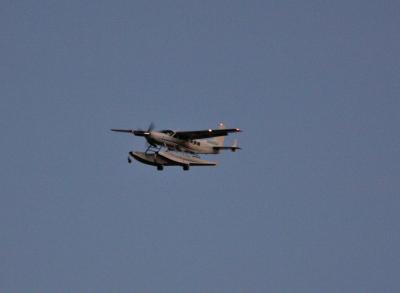Airport Suits Will Cost Town Nearly $1 Mill

Six separate legal actions — in federal court, state court, and before the Federal Aviation Administration — challenging the policies and laws adopted by the town this year to reduce the impact on residents across the East End of noise from helicopters, jets, and other planes using East Hampton Airport will cost close to $1 million, or even more, in legal fees this year.
The town is being “vigorously” defended, East Hampton Town Councilwoman Kathee Burke-Gonzalez said Tuesday. The legal fees are being paid with money from the town’s airport fund, with revenues coming from airport landing and other fees.
With a resolution on Tuesday, the town board increased, from $425,000 to $875,000, the amount authorized for legal fees this year for its main aviation attorney, Peter Kirsch. So far, $694,000 has been spent.
In July, the board authorized spending up to $100,000 to hire Kathleen Sullivan of Quinn, Emanuel, Urquhart, & Sullivan, who was described by Ms. Burke-Gonzalez on Tuesday as “one of the nation’s pre-eminent appellate advocates,” to lead the appeals process in one of the legal cases.
The two cases in federal court were initiated by the Friends of the East Hampton Airport, a coalition of aviation groups, and are before Judge Joanne Seybert in the Eastern District Court.
Friends of the East Hampton Airport sued the town over its adoption last spring of two overnight airport curfews — an 11 p.m. to 7 a.m. restriction for all planes, and an 8 a.m. to 9 a.m. closure to craft deemed “noisy” under F.A.A. standards — and a limit of one round trip per week during the summer season for noisy planes.
The judge barred the once-a-week limit until the case is heard, but let the curfews stand. In July the town appealed that decision, and hired Ms. Sullivan for the case.
Ms. Burke-Gonzalez and Elizabeth Vail, the town attorney, attended a mediation session in New York City yesterday in that case, which was ordered by the Court of Appeals.
Friends of the East Hampton Airport also sued the F.A.A. in federal court to get the agency to enforce certain contractual agreements with the town regarding the airport, called grant assurances, and other federal aviation laws, which would prevent the town from enforcing its airport use restrictions.
The town has asked for permission to intervene in the case, “because the Town of East Hampton relied on the F.A.A.’s legal conclusions in enacting the noise restrictions,” Ms. Burke-Gonzalez said Tuesday, and therefore has “a vested interest in the outcome of the lawsuit against the F.A.A.”
In addition to the federal court cases, three administrative “Part 16” lawsuits have been filed against the town claiming violations of the airport grant assurance agreements with the F.A.A.
In one, Sound Aircraft, an aviation business based at East Hampton Airport, challenged an increase in fees for landings and fuel sales. The town has filed a motion for dismissal. Sound Aircraft also filed a parallel Article 78 lawsuit in state court over the fees, which is on hold pending resolution of the related litigation.
A second case was filed by the Friends of East Hampton Airport, raising issues regarding airport maintenance and the fees charged for leases on airport land used for non-aeronautical purposes, as well as the increased fees. The town has already addressed or is addressing those issues, said Ms. Burke-Gonzalez, and “has offered to work cooperative with the F.A.A. on a corrective action plan.”
The third Part 16 lawsuit was filed by a group led by the National Business Aviation Association regarding the curfew and once-a-week restrictions on noisy planes. The town has filed a motion to dismiss that case as well.
The cases are being heard by the F.A.A.; decisions are not expected until next year.
The town “was fully prepared for [the] litigation,” said Ms. Burke-Gonzalez Tuesday.
Between money in the airport budget allocated for legal fees this year, and larger-than-anticipated revenue from landing fees (a total of $1.8 million or $1.9 million is anticipated), and the use of “a small portion” of an airport fund surplus that stood at over $1 million at the start of this year, the airport budget “will easily cover the litigation costs,” said Town Supervisor Larry Cantwell yesterday.
Ms. Burke-Gonzalez said Tuesday that the town is “moving forward to continue to find solutions,” even as the court actions progress.
Numerous residents have come to the board recently to urge continued action, saying that the overnight curfews this summer had not adequately allayed aircraft noise.
“The three local laws we enacted were designed to complement each other and work comprehensively to address the noise problem in a balanced, reasonable manner,” said Ms. Burke-Gonzalez earlier this week, acknowledging that the two curfews had not solved the problem. “The one-trip-per-week limit is crucial in limiting aircraft noise and ensuring the quality of life of East End residents,” she said.
An airport noise consulting firm used by the town, she said, has been enlisted to help the board evaluate the effectiveness of the curfews and analyze data on aircraft operations and noise complaints for the recent season, from May 1 to Sept. 30. The results will be presented to the public, the councilwoman said.
In a short preview presentation on Tuesday, Jemille Charlton, the airport manager, said that, for the period of January through July 2015, takeoffs and landings by all types of aircraft at the airport had increased by 29 percent over last year. There was a decrease in jet flights and a 70-percent increase in seaplane flights, prompting complaints about those craft to increase by 149 percent. The number of helicopter operations remained essentially the same.
The total number of complaints about aircraft noise increased by 63 percent over last year.
